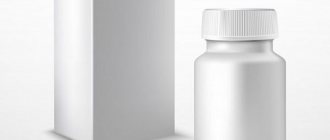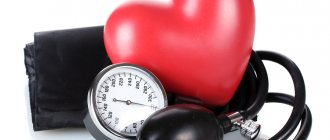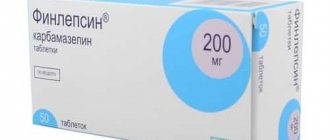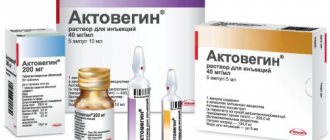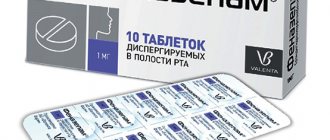Cipralex tablets are an antidepressant from the group of selective serotonin reuptake inhibitors (SSRIs), thanks to this biochemical action, which ensures the pharmacological and clinical effect of taking the drug.
The active substance is escitalopram, it is similar to the main binding element and the allosteric element of the serotonin transporter located next to it, and is practically incapable of binding to an abundance of receptors. Maximum concentrations after repeated doses are achieved on average within 4 hours. The half-life of the drug is about 30 hours.
In patients over 65 years of age, escitalopram is eliminated at a lower rate than in younger patients. The amount of the substance entering the systemic circulation, which is calculated using the pharmacokinetic parameter AUC (“area under the curve”), is 50% greater in elderly patients than in healthy young volunteers.
Compound
The composition of the drug is given equivalent to the three main forms of release (see the next paragraph) based on the mass calculation per one tablet of the active substance escitalopram oxalate - 6.39/12.77/25.54 mg:
- fine crystalline cellulose (MCC) – 72.49/97.49/195 mg;
- ordinary talc 5.04/7/14 mg;
- croscarmellose sodium – 3.24/4.5/9 mg;
- Magnesium stearate – 0.9/1.25/2.5 mg.
The film coating of the tablets is an important component of the drug Cipralex. It consists of:
- hypromellose 5cP – 1.58/2.19/3.51 mg;
- titanium dioxide (E171) – 0.526/0.73/1.17 mg;
- macrogol 400 – 0.146/0.2/0.325 mg.
Release form
The drug is available in the form of round or oval biconvex white film-coated tablets with different dosages:
- 5 mg of active substance (marked “EK”) – 14 tablets in a blister pack (usually made of aluminum foil or PVC), 2 packs in a cardboard box.
- Cipralex 10 mg (symmetrical o and “L” relative marks on one of the surfaces) – 14 tablets in a blister, 1, 2 or 4 contours in a box.
- 20 mg of biologically active component (marked “E” and “N” on both sides of the line on one side of the tablet) - in a box there are 2 blisters with 14 filled cells.
Reviews
Most reviews about Cipralex are positive, due to its effectiveness, relative mildness of action, easy tolerability and fairly quick results. People who took the drug noted that it helped them cope with the disease and in almost all cases was relatively well tolerated, causing a small number of completely tolerable side effects.
and others. But after 1–2 weeks, my health improved significantly, my mood increased, an interest in life appeared, a desire to do something, etc. After stopping the drug, the disease was practically cured, and people resorted to help to completely normalize their well-being.
Negative reviews about Cipralex are few and in most cases they are due to side effects that are difficult to tolerate. People did not tolerate the drug well and therefore did not feel any improvement in their mental state. Against the backdrop of such a negative impression, people left negative reviews.
Pharmacological action
Cipralex belongs to the pharmacological group of potent antidepressants . serotonin transporter enzyme , the drug inhibits the reuptake of the neurotransmitter in synaptic structures (the drug has a greater effect on the metabolic pathways of serotonin than on any other messengers). Accordingly, the physiological transmitter of the impulse is located in the synaptic cleft of the neuronal contact for a longer period of time, which causes an enhanced, prolonged effect on the postsynaptic membrane .
It should be noted that the drug is strong and long-acting, as it binds in two places to the serotonin transport enzyme. First of all, the main active component has high affinity for the primary amino acid sequence of the transporter protein. Also, the components of Cipralex bind to the allosteric center of this molecule, which secondarily enhances the effect of the drug, that is, leads to a more complete inhibition of neurotransmitter reuptake.
Cipralex exhibits weak activity to receptors as:
- serotonin 5-HT1A and 5-HT2;
- dopamine D1 and D2;
- alpha and beta adrenergic synapses;
- histamine H1 receptor cells;
- opioids and benzodiazepines;
- m-cholinergic receptors.
Cipralex - therapeutic effect
The therapeutic effect of Cipralex is provided by its active substance - escitalopram, which slows down the disposal
in structures
. As a result, serotonin remains in the receptors longer and causes its inherent pharmacological effects, which include improving mood, increasing interest in life and stopping the pathological decrease in the general emotional background and mood.
Since it is the deficiency of serotonin in the brain that is one of the most significant factors in the development of depression, panic states and phobias, increasing its concentration will help eliminate these mental disorders. Cipralex and other drugs from the group of selective serotonin reuptake inhibitors do not increase the amount of this mediator in brain structures, but prolong the duration of action of existing endogenous serotonin.
That is, the main therapeutic effects of Cipralex are anti-anxiety and antidepressant (thymoanaleptic). It is these effects that determine the scope of application of the drug, which is the treatment of depression and panic disorders.
Pharmacodynamics and pharmacokinetics
The absorption of the active ingredients does not depend on food intake, since the drug is an extremely strong pharmaceutical drug. Absolute bioavailability is about 80 percent, and the average half-life is 4 hours (however, this parameter may vary depending on the individual parameters of the body and environmental conditions).
Cipralex is metabolized in the liver . The constituent elements of the drug, even after oxidation, remain biologically active and, undergoing some changes in metabolic processes, are released in the form of glucuronides . Next, the metabolites are sent to the kidneys, which excrete waste drug residues through urine. Clearance after oral administration of the drug is 0.6 l/min.
The kinetics of escitalopram oxalate is described linearly. Equilibrium concentration in the systemic circulation, with a daily dose of 10 mg (the optimal amount of the active ingredient for an adult), is achieved after just one week of a conservative course of treatment with Cipralex.
In elderly patients (over 65 years of age), the pharmacological drug is eliminated somewhat more slowly. Clinical trials have shown that during a therapeutic dose, after a single dose of Cipralex, the amount of the active component in the systemic bloodstream of elderly people is 50 percent greater than in young volunteers.
Which is better CIPRALEX or FLUOXETINE
| The drug CIPRALEX |
| The drug FLUOXETINE |
Name:
Oksana Kovalevskaya
Review:
The drug helps me a lot, I haven’t observed any side effects, there is a slight weight loss, I think due to the peace of mind.
Name:
ALICA
Review:
took it for 4 months.
The effect came within a month (the doctor promised in 2 weeks). It was enough for 3 months. then it “came over” again... Name:
Elena Rudneva
Review:
After 8 months of taking Starcitin, the doctor switched me to Cipralex. After three weeks of taking Cipralex, severe nosebleeds began every 3-4 days. The blood was flowing like a fountain. Doctors from “ The ambulance was unable to stop the bleeding with tamponade.
I checked the whole body, and by elimination I got to Cipralex. I abruptly stopped taking it - life is more valuable - the bleeding stopped within a week. Name:
Nina M
Review:
took it for 4 months.
The effect came within a month (the doctor promised in 2 weeks). It was enough for 3 months. then it “covered” again... Name:
Lydia G
Review:
Has anyone been allergic to Cipralex?
Name:
Olga Rusin
Review:
on the contrary, I gained weight
Name:
Serg
Review:
While taking Cipralex, can you drink alcoholic beverages?
Name:
Maria Lipich
Review:
This question interests me too!!!
Name:
Alina Alina
Review:
Cipralex did not work, I read the comments and decided to give up antidepressants altogether.
I’ll switch to Biotredin, I’m already taking it, it relieves all anxieties and fears, improves my mood, and has no side effects or addictive effects. Name:
Kati-casino
Review:
Where do such crazy details come from???
Name:
Marina Tolmacheva
Review:
I started getting dizzy while taking Ciprolex.
Name:
Oksana
Review:
Is it possible to take Cipralex for years?
I've been on antidepressants for over seven years! I cancel it, three months and it’s back again, I took Paraxetine, now I’ve been on Cipralex for three years. He has attacks (hypertension, increased blood pressure, tachycardia, tremor) almost every day. What should I do to change my antidepressant? Name:
Dmitry Kamenev
Review:
Pros: + The effect is uniform, the mood is average and stable. + Just gradually become a normal person. Cons: - Decreased libido. - Increased weight.
I have been taking it for about 2 months now, but the doctor does not allow me to shorten the course from 6 months to three. I don't plan to sit on them for the rest of my life.
Name:
Milana Gold
Review:
I took this drug for a long time, but I only saw improvements.
Maybe you should consult a good psychotherapist and have your adrenal glands checked, because the reason for the increase in blood pressure and PA may be due to the uncontrolled release of adrenaline. Name:
He Boy
Review:
Great product. Combined with Lamictal, it changed my whole life. There is silence, tranquility, harmony and order at home. My head is not buzzing. The bad thoughts are gone. I feel great! And I wish the same to everyone suffering from bipolar and manic depression. Buy at a discount
Promo code for discount MAT6375
Name:
jeRs
Review:
I have an adrenaline rush every day, my blood pressure and pulse rise to 140, I was prescribed phenozepam and cipralex.
I don’t even know why I’m trying so hard not to be nervous, they say Vegetovascular Destiny. Will these drugs help? Name:
pH
Review:
I have adrenaline rush every day, my blood pressure and pulse rise to 140, I was prescribed phenozepam and cipralex.
I don’t even know why I’m trying so hard not to be nervous, they say Vegetovascular Destiny. Will these drugs help? Name:
Karina Odintsova
Review:
The doctor prescribed Cipralex!
However, after reading the reviews, I doubt that I should take it, as they say it is addictive. I heard that Neurofulol is better to drink, it is of better quality and is not addictive. Name:
Zinaida
Review:
the best antiques, the head works, super.
Name:
IVAL 13-666
Review:
Doctor recommended this today. Together with fcnazepam... Since I’ve been walking for three weeks and I’m crying... out of the blue. And heaviness in my chest. Changing jobs won't help. I try to think positively. Helps a little but not for long
FLUOXETINE drug reviews
Name:
Artem Teply
Review:
I started taking it on September 5, 2020, 20 mg per day. I will write another review in 3-4 weeks.
For now I only feel drowsy.
Name:
Yulia Vorobyova
Review:
I started taking it on September 5, 2020, 20 mg per day. I will write another review in 3-4 weeks.
For now I only feel drowsy.
Name:
Oksana Khromova
Review:
I want to sleep, but calm has appeared
Name:
Marina Korosteleva
Review:
My husband’s potency completely disappeared against the background of fluoxetine, even Smartprost stopped helping, and now, as I see, the situation has only worsened... In my opinion, antidepressants are not a solution at all situations.
Name:
Nikolay Kubarev
Review:
Didn’t help at all, it made me more anxious
Name:
Alexander Rudakov
Review:
My husband’s potency completely disappeared on the background of fluoxetine, even smartprost stopped helping, and now, as I see, the situation has only worsened... In my opinion, Antidepressants are not a solution at all.
Name:
Lyudok
Review:
The neurologist prescribed me Fluoxetine + Adaptol, the effect is excellent, panic attacks against the background of VSD have passed, my general condition has improved, there is no fatigue and anxiety characteristic of VSD!!
Name:
Tanya
Review:
Helped me a lot.
I'm in a good mood, my head is clear. No panic, just positive... Name:
Raki Gladiator
Review:
Quite a lot of side effects. Increases anxiety and sleep disturbance.
Source: https://BadZdorov.ru/lekarstva-sravnenie/chto-luchshe-tsipraleks-ili-fluoksetin/
Indications for use
It is recommended to include Cipralex in a conservative treatment regimen if neurological pathologies such as:
- prolonged periods of depression of any severity;
- panic disorders (which may be explained by agoraphobia - fear of open spaces);
- depressive stage of manic-depressive psychosis ;
- various types of social phobias or simply anxiety among people;
- obsessive-compulsive disorder (the medical explanation for “obsession”);
- neurosis ;
- generalized anxiety syndrome.
Contraindications
Pharmacological treatment with Cipralex should be abandoned if:
- hypersensitivity or intolerance to the constituent components of the drug;
- childhood and adolescence (the therapeutic course is not recommended for those under 18 years of age);
- simultaneous treatment with monoamine oxidase (antidepressants) or p imozide (antipsychotic medications);
- acute or chronic renal failure with creatine clearance below 30 ml/min;
- epilepsy , which is not controlled by pharmacological agents.
Cipralex should only be taken under the supervision of qualified medical personnel in one of the following situations:
- non-insulin-dependent diabetes mellitus (for type I, consultation with an endocrinologist is required);
- elderly age;
- cirrhosis , acute or chronic liver failure ;
- tendency to frequent hemorrhages due to insufficiency of the blood coagulation system;
- hereditary and acquired metabolic diseases .
Side effects
Cipralex is a strong drug, therefore its action can be characterized by a large number of unwanted reactions from the body. For example, it is noted:
- dyspeptic disorders ( nausea , vomiting , diarrhea , abdominal pain);
- asthenic syndrome ( insomnia or drowsiness , headache, constant fatigue, dizziness );
- metabolic disorders in the form of sweating , hyperthermia and hyponatremia ;
- thrombocytopenia and, as a consequence, insufficiency of the blood coagulation system;
- orthostatic collapse or hypotension ;
- decreased reproductive function ( decreased libido and potency in both men and women);
- allergic reactions (the range of undesirable effects includes manifestations from angioedema, angioedema , up to anaphylactic shock );
- arthralgia and myalgia of idiopathic origin , which are not associated with stress on the joints or muscles;
- skin rash , purpura , ecchymosis .
It should be noted that the adverse effects of treatment usually occur in the first or second week of a conservative therapeutic course and significantly reduce their manifestations if the rehabilitation is continued according to a given plan.
Since the drug belongs to list B of pharmacological products, if you abruptly stop taking Cipralex after long-term treatment with the drug, withdrawal syndrome . That is, the body does not have enough active substance. This manifests itself in the form of severe headaches, irritability, nausea and frequent dizziness.
Drug interactions
- non-selective irreversible MAO inhibitors: high risk of developing serious adverse reactions, including serotonin syndrome (the break should be 7 days before their appointment and 14 days after their discontinuation);
- serotonergic drugs, irreversible MAO B inhibitors, reversible selective MAO A inhibitors: risk of developing serotonin syndrome (not recommended combination);
- lithium, tryptophan: the effect of escitalopram may be enhanced;
- drugs that lower the seizure threshold (other SSRIs, tricyclic antidepressants, neuroleptics - phenothiazine derivatives, mefloquine, bupropion, butyrophenone, thioxanthene, tramadol): there is a marked decrease in the seizure threshold;
- St. John's wort: possible increase in the number of side effects;
- anticoagulants and agents that affect blood clotting (most tricyclic antidepressants, atypical antipsychotics, phenothiazine derivatives, non-steroidal anti-inflammatory drugs, acetylsalicylic acid, dipyridamole, ticlopidine): there is a possibility of bleeding disorders (if simultaneous use is necessary, blood clotting indicators should be carefully monitored);
- inhibitors of the CYP2D6, CYP3A4 and CYP1A2 isoenzymes (for example, cimetidine), inhibitors of the CYP2C19 isoenzyme (for example, omeprazole, fluoxetine, lansoprazole, fluvoxamine, ticlopidine, fluoxetine): an increase in the concentration of escitalopram in the blood plasma is observed (a dose reduction may be required);
- drugs metabolized by the CYP2D6 isoenzyme (for example, clomipramine, desipramine, nortriptyline, thioridazine, haloperidol, risperidone), including those with a small therapeutic index (for example, metoprolol, propafenone, flecainide): there is an increase in the concentration of escitalopram in the blood plasma (may be required correction of its dose);
- drugs metabolized with the participation of the CYP2C19 isoenzyme: changes in their concentration are noted (caution should be exercised).
Instructions for use of Cipralex (Method and dosage)
The use of Cipralex does not depend on meals during the day. The duration and intensity of the course of conservative treatment largely depends on the initial disease:
- So, to achieve an antidepressant effect, loading doses are used for 2-4 weeks (10 mg of Cipralex per day for an adult patient) and maintenance therapy for the next 6 months to consolidate the results obtained.
- The instructions for Cipralex for panic disorders are very different - pharmacological therapy begins with 5 mg of the drug with a further increase in the daily dose to 10 mg. Depending on the individual reaction of the body, the amount of the drug can be increased to 20 mg per day. The maximum effect is achieved after 3 months, but rehabilitation can last up to six months.
- In patients with renal or liver failure (both acute and chronic), but with absolute indications for the use of Cipralex, the maximum single dose is 5 mg. An increase is not recommended, but if the desired therapeutic effect is not achieved, then the amount of the administered drug is doubled.
Cancellation of Cipralex
Cipralex is discontinued gradually to minimize withdrawal symptoms. Typically, the dosage is reduced by 5 mg every week, bringing it to 5 mg. That is, from 20 mg in the first week the dosage is reduced to 15 mg per day, in the second week the dose is reduced to 10 mg, and in the third – to 5 mg. Then take the drug 5 mg per day for another 1 - 2 weeks and completely stop taking it.
If during the process of reducing the dosage a person experiences withdrawal symptoms, then they return to the usual dosage and take the drug for another 2 to 3 weeks. After which they begin to reduce the dosage by 5 mg, but not every week, but once every 2 to 3 weeks. Thus, the drug is gradually discontinued completely.
Overdose
In clinical practice, cases of overdose of Cipralex are known, which usually manifest themselves as follows:
- darkened consciousness, soporosity ;
- tremor of the limbs , impaired fine motor skills;
- seizures;
- agitation (strong emotional arousal, which is accompanied by a feeling of anxiety and an unreasonable need to move);
- significant changes in the electrocardiogram (expansion of the ventricular complex, depolarization of the depolarization segment);
- arrhythmias of the tachycardia ;
- metabolic acidosis , hypokalemia ;
- depression of the respiratory function of the respiratory system.
There is no specific antidote or antagonist for Cipralex, so treatment of overdose is based on symptomatic and palliative care for the patient. First of all, you should rinse the stomach in order to evacuate unabsorbed remnants of the pharmaceutical drug from the body. Next, it is necessary to ensure sufficient oxygenation and constant monitoring of the vital systems of the human body.
Interaction
The simultaneous use of Cipralex and drugs that irreversibly inhibit monoamine oxidase , since the percentage of severe side effects increases several times (the percentage of respiratory or heart failure ).
Based on pharmacological studies, it is not recommended to include Cipralex and reversible MAO inhibitors due to the risk of serotonin syndrome (a potentially fatal situation).
The drug with escitalopram in parallel with anticoagulants or drugs that reduce blood clotting , as this can lead to severe hemorrhagic syndrome and anemia as an outcome of the pathological situation, which will complicate the treatment of the patient.
There are a number of pharmaceutical drugs that, by interacting with the allosteric centers of carrier proteins, increase the activity of Cipralex. For example, Omeprazole (an anti-ulcer drug) leads to a twofold increase in the concentration of the active substance in the systemic circulation, and Cimetidine (a H2-histamine receptor blocker, which is prescribed for pathology of the gastrointestinal tract) - by 70%.
Drugs that inhibit serotonin , and Cipralex, as a typical representative of this pharmacological group, reduces the threshold of convulsive activity, that is, tremor and/or convulsive syndrome may manifest itself in response to less intense excitation. This effect will be potentiated if Cipralex and other strong antipsychotic substances ( neuroleptics ) are taken simultaneously, for example Tramadol, Phenothiazine, Butyrophenone, and so on.
Use during pregnancy and lactation
The available information on the use of the drug in pregnant women is currently insufficient.
Experiments on the administration of escitalopram to animals prove the presence of reproductive toxicity. Cipralex during pregnancy should be taken only according to strict indications and after a careful assessment of the balance of potential benefits and probable risks for the mother and fetus. If Cipralex was taken late in pregnancy, especially in the third trimester, the newborn should remain under observation for some time. If escitalopram is continued until the onset of labor or the drug is stopped shortly before birth, the baby may develop withdrawal symptoms.
When the mother takes Cipralex in late pregnancy, the newborn may experience the following side effects: poor sleep, drowsiness, irritability, continuous crying, lethargic sleep, high neuro-reflex excitability, tremor, hyperreflexia, muscle hypotonia, convulsive disorders, apnea, cyanosis, depression respiratory center, hypertension, temperature fluctuations, hypoglycemia, feeding problems, vomiting.
According to epidemiological studies, the use of Cipralex during pregnancy, especially in later stages, may increase the risk of persistent pulmonary hypertension in newborns (approximately 5 cases per 1000 pregnant women).
Researchers believe that escitalopram is excreted in breast milk, so breastfeeding should be stopped during treatment with Cipralex.
special instructions
Cipralex does not have a depressing effect on the patient’s intellectual or psychomotor sphere, however, while continuing the course of conservative treatment, it is recommended to refrain from driving a car or operating technical devices that require prolonged concentration and fine motor skills.
The drug can contribute to a change in the concentration of glucose (a significant increase) and insulin (a relative decrease in the hormone) in the systemic circulation, and accordingly, such treatment requires a certain correction of hypoglycemic drugs in patients with diabetes mellitus .
Antidepressant therapy can lead to suicidal thoughts in the early stages of the rehabilitation course. An increased risk of self-inflicted bodily harm and suicidal tendencies persist until remission of the underlying disease, therefore conservative treatment with Cipralex should be carried out in special departments under the supervision of qualified medical personnel.
How it works: antidepressants
According to statistics, depression and anxiety disorders affect 17-20% of people at least once in their lives.
Residents of large cities are in particular danger, constantly experiencing exorbitant loads and inhuman stress. Antidepressants are used to treat depression and anxiety. First of all, selective serotonin reuptake inhibitors (SSRIs). Many people refuse to drink them for fear of side effects and fear of getting hooked, perceiving them as a kind of “drug of happiness.” Let's look at how antidepressants actually affect the brain.
Biological origins of depression
In the 50s of the last century, scientists proposed the first hypothesis about the origin of depression.
They noticed that low levels of norepinephrine in the brain (this was observed when taking certain drugs, for example, reserpine, a medicine for hypertension) leads to side effects such as lethargy, apathy and depressed mood.
And after taking amphetamine, which increases the level of norepinephrine in the brain, completely opposite symptoms occur - the person becomes energetic and active. Sometimes even too active.
via WikiMedia Commons
In this regard, scientists have suggested that low levels of norepinephrine in the brain lead to depression, and high levels lead to the opposite effect, that is, mania. But later it turned out that norepinephrine is not the only substance that regulates mood. Similar effects—a transition to depression or to mania—were observed when the levels of serotonin and dopamine in the brain decreased or increased, respectively.
It turned out that depression is a complex condition that may be associated with the improper functioning of several neurotransmitters. It was necessary to find a drug that would have a complex effect on the brain. And scientists even managed to invent two such drugs. More precisely, two classes of drugs are tricyclic antidepressants and monoamine oxidase inhibitors (MAOIs).
What's wrong with first generation antidepressants?
Unfortunately, they turned out to have many side effects - precisely due to their complexity and indiscriminate effect on the brain.
Tricyclic antidepressants, in addition to receptors for norepinephrine and serotonin, also act on histamine, cholinergic and adrenergic receptors. Because of this, the drug causes a number of side effects: weight gain, dry mouth, decreased visual acuity, constipation, dizziness, decreased blood pressure (even fainting), drowsiness and lethargy.
MAO inhibitors act somewhat differently, but their activity also causes a lot of side effects. Monoamine oxidase is an enzyme that is involved in the destruction of substances of the monoamine class. Monoamines are serotonin, melatonin, histamine, adrenaline, dopamine and norepinephrine.
MAO inhibitors prevent the enzyme from breaking down monoamines, which causes more of them to appear in the brain. There is more serotonin, dopamine and norepinephrine needed by a depressed person - but also more histamine, melatonin and adrenaline.
Hence, again, problems with sleep and digestion, dry mouth, dizziness, low blood pressure, weight gain and low libido.
via PixaBay.com
But in the case of MAO inhibitors, this is not even the worst thing. These drugs interact with a substance called tyramine. This causes a strong increase in blood pressure - even death.
Therefore, when taking this type of antidepressant, you need to adhere to a strict diet, excluding from it all foods containing tyramine: cheeses, red wine and beer, smoked meats, legumes, caviar and others.
In addition, MAO inhibitors react with many medications, which can cause unpredictable side effects.
Since treatment with tricyclic antidepressants and MAO inhibitors caused too many “side effects”, which were sometimes worse than depression itself, a more effective and selective drug had to be invented.
Selective serotonin reuptake inhibitors
Drugs from the SSRI group, as their name suggests, act on serotonin receptors very selectively. Namely, they prevent the reuptake of serotonin by the neurons that produced it. Thanks to this, the concentration of serotonin in the brain increases, and the symptoms of depression gradually go away.
Today, SSRIs are the most common and prescribed antidepressants. This group includes drugs such as fluoxetine (best known under the brand name Prozac), paroxetine (Paxil), sertraline (Zoloft), escitalopram (Cipralex).
via PixaBay.com
Over time, it became clear that SSRIs are not so selective and act indirectly on receptors other than serotonin. Therefore, while taking SSRIs, especially in the first weeks, side effects are also observed.
Most often these are nausea, dizziness, drowsiness, digestive disorders and decreased libido. But all this cannot be compared with the “side effects” from drugs of the previous generation.
In addition, over time, some of these negative effects disappear.
Medicines from the SSRI group are not interchangeable. Each of them has its own set of indications and side effects, and only a psychiatrist can determine which drug is best suited in each specific case. This is not an easy task, and it is not always possible to find the right medicine the first time.
The agony of choice
So far, scientists have not come up with an analysis that would allow them to choose the appropriate antidepressant. Work in this direction is underway; There are genetic tests that can show which medicine will be absorbed better or worse. But still, the doctor makes a decision mainly on the basis of the patient’s clinical picture, taking into account the possible “side effects” of the drugs.
Often people with depression think that their psychiatrist is prescribing medications at random. Let's find out what doctors actually use when choosing this or that remedy.
Paroxetine
This antidepressant, in addition to its main effect, has some sedative effect. Therefore, paroxetine is used not only to treat depression, but also to combat anxiety disorders. Depression often goes hand in hand with various forms of anxiety and panic attacks. If a person has severe anxiety in addition to depression, paroxetine is the drug of first choice.
via WikiMedia Commons
The disadvantages of paroxetine stem from its advantages - it more often than other drugs leads to such “side effects” as drowsiness, lethargy and dizziness.
Paroxetine also reduces libido more than other SSRIs and makes it more difficult to achieve orgasm. In addition, paroxetine has the most severe withdrawal syndrome.
For some time after stopping taking the drug, a person may experience nausea, foggy consciousness, a feeling of “currents” throughout the body and other unpleasant symptoms.
Fluoxetine
Unlike paroxetine, this medicine gives a rather stimulating effect. Thanks to this, it is well suited for those whose main problem is apathy.
But for those who have anxiety, fluoxetine is not very indicated - it can increase it.
Stimulant antidepressants should also not be prescribed to those who have suicidal thoughts: at first, when depression has not yet passed and strength has already appeared, a person may decide to commit suicide.
Compared to other SSRIs, fluoxetine causes minimal disturbances in libido. Another “bonus” of fluoxetine is a decrease in appetite. But many people already lose their appetite due to depression - fluoxetine is not suitable for such people, because it can increase the exhaustion of the body.
Fluoxetine “gains momentum” more slowly than other SSRIs: you will have to wait about four weeks for the first effect (with other drugs in this group, two are usually enough).
And in general, it is weaker than all other SSRIs. But fluoxetine takes a long time to be eliminated from the body, so it’s not so scary if a person forgets to take the pill on time.
For the same reason, fluoxetine does not have a severe withdrawal syndrome.
Sertraline
This drug is considered optimal in terms of the combination of price, effectiveness and side effects. If the patient does not have any special circumstances or contraindications, he will most likely be prescribed sertraline.
via WikiMedia Commons
It moderately reduces sexual desire, does not greatly increase the risk of weight gain, improves sleep, and has a moderate stimulating effect. And in general it is well tolerated by the body. True, sertraline causes diarrhea more often than other SSRIs.
Escitalopram
This antidepressant begins to work faster than others. Like paroxetine, it helps people with depression accompanied by severe anxiety and has a calming effect. At the same time, escitalopram does not have so many side effects. In particular, it does not increase drowsiness and lethargy as much and causes fewer sexual problems.
The main disadvantage of escitalopram is its high price, which is at least twice the cost of other SSRIs.
SSRI
There is another, improved version of antidepressants - selective serotonin and norepinephrine reuptake inhibitors. As the name suggests, they also act on norepinephrine receptors. Due to this, they should be more powerful than SSRIs, but there is no clear evidence for this.
via PixaBay.com
For example, one of the most popular SSRIs, venlafaxine, turned out to be more effective than fluoxetine. But since fluoxetine is the weakest of the SSRIs, it is not a fact that venlafaxine is superior in effectiveness to other drugs in this group. But venlafaxine costs about the same as most SSRI drugs.
Another SSRI, duloxetine, works no better than other antidepressants and is even less well tolerated than SSRIs (especially compared to escitalopram). Its only bonus is that it is somewhat effective against fibromyalgia, a pain syndrome that often accompanies depression. At the same time, duloxetine is approximately one and a half times more expensive than escitalopram.
Atypical antidepressants
Among them, for example, bupropion - it blocks the reuptake of dopamine and increases the level of norepinephrine. Bupropion may be used with an SSRI for additional stimulant effects.
To treat or not to treat?
Scientists who conducted a large meta-analysis of studies of antidepressants concluded that SSRIs and venlafaxine are effective only for very severe depression.
And for patients with moderate to mild depressive symptoms, these pills are no more effective than a placebo.
So it makes sense to take antidepressants only when there is no way to “get out” on your own. And this must be determined by a psychiatrist.
via PixaBay.com
However, there is a risk that the effect of SSRI treatment will wear off over time. Between 9 and 57% of patients who take a maintenance dose of an SSRI experience periodic relapses. As a solution, doctors suggest using the lowest dose for maintenance therapy and increasing it when depressive symptoms return.
Not everyone needs constant use of antidepressants, but only people with endogenous recurrent depression - those who have had three or more depressive episodes in a row.
Most often, the reason for this is a genetic predisposition to improper functioning of neurotransmitters and their receptors. These patients typically require lifelong support in the form of pills.
For other people, a year of taking antidepressants is usually enough to recover and restore the balance of neurotransmitters; so the fear of getting hooked on them is most often not justified.
Similar
Source: https://techfusion.ru/kak-eto-ustroeno-antidepressanty/
Cipralex's analogs
Level 4 ATC code matches:
Actaparoxetine
Plizil
Fluxen
Paroxin
Surlift
Asentra
Elycea
Fluoxetine
Lenuksin
Escitalopram
Adepress
Selectra
Stimuloton
Citalopram
Cipramil
Zoloft
Paroxetine
Prozac
Paxil
Rexetine
Currently, the following analogues of Cipralex can be found on pharmacy shelves: Escitolopram-Teva, Selectra, Elitseya, Miracitol .
Reviews of Cipralex
Those who took Cipralex are overwhelmingly satisfied with the effects of conservative treatment. The drug really helps to cope with phobias of various origins, allowing you to live a fuller life, not limited by fears, anxieties or worries about trivial reasons. However, recipients' feedback is often clouded by personal experiences of adverse reactions. Especially often there is a broken state , insomnia , and constant painful agitation .
Also, reviews of Cipralex on the forums say that in the vast majority of cases, libido and/or potency ( erectile dysfunction , dystonia of the muscles responsible for reproductive functions, changes in the perception of sexual intercourse, and so on). Both men and women complain about this side effect in equal numbers. What is interesting is that reviews of those taking antidepressants are also full of gratitude to the drugs for reducing desire, since satisfying animal instincts did not bring joy or long-awaited relief during depression.
Reviews from doctors about Cipralex primarily clinically and statistically confirm the effectiveness of the drug in the conservative treatment of neurological disorders . An antidepressant of such strength copes with depression and psychosis where more gentle methods do not bring any results. Side effects are perceived by specialists as necessary losses, because undesirable manifestations will disappear after a full course of sanitation.
Characteristics of the drug
I bought the tablets without any problems. I gave the recipe, paid the money and gave everything. Before use, I carefully read the instructions and realized that it is quite difficult to understand the principle of action of an antidepressant. I tried to make jokes based on the reviews of ordinary people and there I came across a more or less normal description.
I will not describe the formula and composition of the tablets; I think that there is no point in diving deeply into incomprehensible chemistry. I was a little upset that the maximum effect from using Cipralex occurs after 3 months of treatment.
This means you will have to buy a significant number of tablets and hope for no side effects, complications for the liver or kidneys.
Cipralex price
The price of Cipralex, of course, depends on the dosage of the biologically active component. You can buy it in Moscow for 900/1400/1800 rubles, respectively 5/10/20 mg of the active ingredient. In Ukraine, the cost of an antidepressant varies from 270 to 500 hryvnia, but the vast majority of pharmacies sell the drug for 400 hryvnia.
- Online pharmacies in RussiaRussia
- Online pharmacies in UkraineUkraine
ZdravCity
- Cipralex tablets p.p.o.
10 mg 14 pcs. Lundbeck RUB 1,161 order
Pharmacy Dialogue
- Cipralex (tab.p/vol.10mg No. 14)Lundbeck
RUB 1,029 order
- Cipralex (tab.p/vol.10mg No. 28)Lundbeck
RUB 2,045 order
show more
Drug price
Currently, Cipralex is sold in pharmacies in Russian cities at the following prices:
- Cipralex 10 mg 14 tablets – 818 – 948 rubles;
- Cipralex 10 mg 28 tablets – 1589 – 1874 rubles;
- Cipralex 20 mg 28 tablets – 3242 – 3389 rubles.
The approximate price for Cipralex tablets with a dosage of 10 mg in pharmacy chains is about 921–1120 rubles (for a package of 14 pcs.) or 1893–2059 rubles (for a package of 28 pcs.). The cost of the drug with a dosage of 20 mg is approximately 3925–4180 rubles (per package of 28 pieces).
